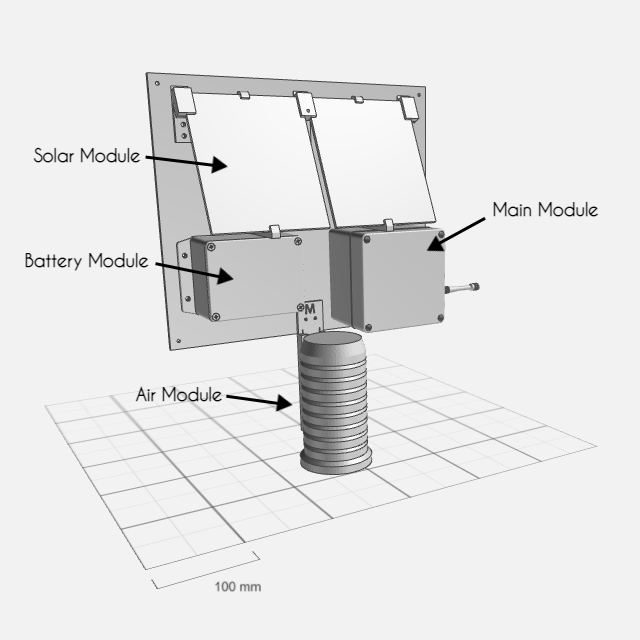LoRa Node
LoRa Node
LoRa is an infant communication technology based on ISM (Industrial, Scientific and Medical) bands which are capable of low power and Long Range applications. LoRaWAN is a Wide Area Network protocol that is designed to embed LoRa technology into a network infrastructure . The mints LoRa Nodes are designed to make use of LoRaWAN technology with each node a part of a mesh network communicating with one Mints Central Node.
The design of the LoRa Nodes consists of 4 main components:
- Solar Module
- Main Module
- Battery Module
- Air Module
Solar Module
The LoRa Nodes are designed to work without the need of direct power nor internet connectivity. This makes it extremely versatile. The main source of power for the LoRa Nodes is sunlight and thus it consists of two solar panels to harness solar energy.
Battery Module
The LoRa Node contains a battery which works in tandem with the solar panels to provide consistent power to the system. The battery is enclosed within a fire proof bag as well as a metal box to safeguard the node against fire hazards.
Main Module
The Main Module contains Seeeduino LoRaWAN Arduino development board with LoRaWan protocol embedded with the RHF76-052AM communication module. The Arduino collects data from the air module and sends it through to the Central Node through its LoRa interface. The Arduino also hosts its own gps sensor for latitude and longitude readings.
The main module also houses a power management board (Sunny Buddy). The Sunny Buddy enables the LoRa Nodes to collect maximum power possible from the solar module and it efficiently stores some of that power within the battery module for its operation through out the night.
The third entity within the main module is a stand-alone breakout timer (TPL5110). If the Arduino receives less power than it needs, it goes into a sleep mode which can only be revived through a break in power. This needs to be avoided since the system needs to work without any human interaction. The breakout timer avoids this situation by breaking the power completely when there is insufficient power and it also revives it when the coordinating solar/battery system can provide enough power to run the system.
Air Module
Each LoRa Node consists of an array of sensors capable of sensing pm, temperature, humidity and pressure. The pm sensor attached to the LoRa node is the Shinyei PPD42NS. In addition, each node is equipped with gas sensors capable of reading concentrations of CO, NO, CHOH, H, NH, CH, CH CH (via MiCS6814) as well as CO (via SCD30).






